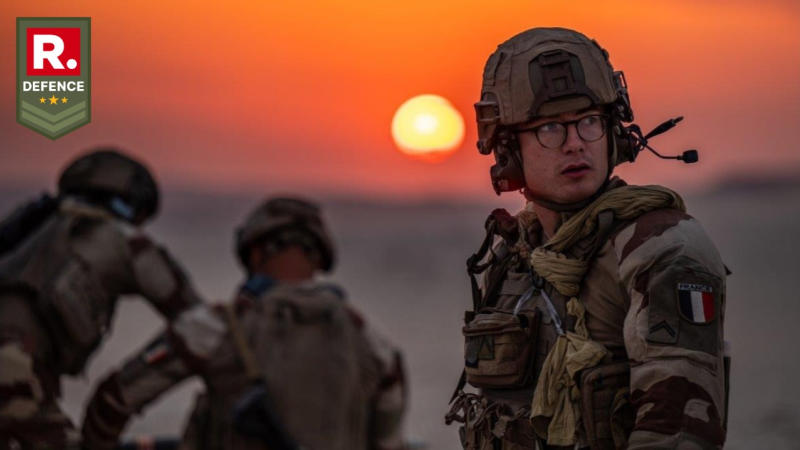Published 08:35 IST, December 26th 2024
France's Military Facing Ouster from Africa as Russia, China, and Turkey Fill the Void
The simultaneous announcements by Chad and Senegal mark a watershed moment in the history of France’s relations with Africa.

Paris, France – France’s historical dominance and influence in Africa face unprecedented challenges as its relationships with key allies in the continent erode. Recent developments in Chad and Senegal, coupled with a broader trend of anti-French sentiment, signal a major shift in the geopolitical landscape of Francophone Africa.
On its Independence Day, Chad’s government announced an end to defence cooperation with France, a move aimed at redefining its sovereignty. Hours later, Senegal’s newly elected President Bassirou Diomaye Faye declared that French troops would soon no longer be stationed in Senegal.
“Just because the French have been here since the slavery period doesn’t mean it’s impossible to do otherwise,” Faye stated in a bold message to Le Monde.
These decisions are the latest in a series of setbacks for France, which has been striving to recalibrate its military strategy in Africa. Chad, once regarded as France’s most steadfast ally in the Sahel, now joins Senegal in rejecting a decades-old defence arrangement that has often been criticized as neo-colonial.
France Reassessing its Troop Deployments
Faced with mounting hostility, France is reassessing its troop deployments and defence strategies. Jean-Marie Bockel, President Emmanuel Macron’s personal envoy for Africa, presented a report recommending significant troop reductions across African bases, with the exception of Djibouti.

The proposed strategy focuses on reducing permanent troop presence while enhancing specific military cooperation programs, such as drone technology and airspace surveillance. France also seeks to mitigate the political liabilities of permanent bases, which have increasingly become targets of local resentment and disinformation campaigns.
“Permanent bases have turned into a double-edged sword,” noted Will Brown of the European Center for Foreign Relations. “They are used as political ammunition against France, complicating its ability to maintain influence.”
The erosion of French influence is amplified by the increasing presence of other global powers. Russia, China, and Turkey are making significant inroads in Africa. Chad’s President Mahamat Deby, for instance, has sought support from the United Arab Emirates, Turkey, and Russia, with Moscow emerging as a key partner.
The rise of the Russian paramilitary Wagner Group in the Sahel has further complicated the security landscape. While these mercenaries provide immediate support to junta governments in countries like Mali and Burkina Faso, their operations have been linked to human rights abuses, raising concerns about long-term stability.
The Decline of Françafrique
France’s diminishing influence is rooted in a legacy of complex, and often fraught, post-colonial relationships. Since the independence of its African colonies, France has maintained a policy known as Françafrique, characterized by economic, political, and military involvement.

Currently, France maintains 600 troops in Ivory Coast, 350 in Senegal, 350 in Gabon, 1,500 in Djibouti, and 1,000 in Chad. While these troops are ostensibly focused on combating extremism, critics argue that their presence has often served to uphold regimes aligned with French interests.
Protests against French influence have surged across Francophone Africa, reflecting popular discontent with the perceived lack of tangible benefits from decades of French involvement. In countries like Niger, Mali, and Burkina Faso, where military regimes have expelled French forces, anti-French rhetoric has become a rallying cry for new alliances with Russia and other powers.
“The countries of Francophone Africa want a change in the nature of this relationship,” said Gilles Yabi, head of the West Africa Citizen Think Tank.
The Security Vacuum
The withdrawal of French forces has left a significant security vacuum in many regions, particularly the Sahel, where extremist groups have exploited the instability. Over 3,000 civilians were killed in the first half of 2024 alone, marking a 25% increase from the previous six months, according to the Armed Conflict Location and Event Data Project.

Analysts argue that the vacuum left by France cannot be effectively filled by Russia or other actors. “The Wagner Group operates on a much smaller scale and is financed by governments with limited resources,” said Shaantanu Shankar of the Economist Intelligence Unit.
The simultaneous announcements by Chad and Senegal mark a watershed moment in the history of France’s relations with Africa. The decisions highlight the diminishing utility of traditional defence arrangements and the urgent need for France to reimagine its role on the continent.
As France seeks to pivot toward greater engagement with Africa’s anglophone nations like Nigeria and South Africa, it faces an uphill battle to retain its influence in an increasingly multipolar and assertive Africa. Whether Paris can adapt to these shifting dynamics remains an open question, but the stakes for its future role on the continent have never been higher.
Updated 08:35 IST, December 26th 2024




